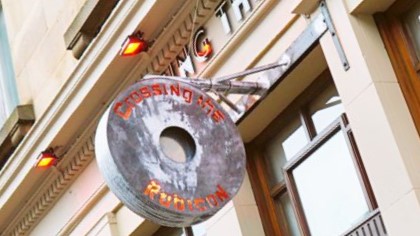Tired of making decisions? Don’t be surprised, after all you must make hundreds, if not thousands every day. And they literally tire you out – your willpower isn’t an infinite resource, it acts like a muscle and gets tired if it is overused.
Have you ever bought a car, or planned a wedding? It’s astonishing the level of detail you have to deal with, all of which involves some decision that has to be debated and agreed. Many choices drain your energy. Its overwhelming, and you eventually give in to whatever the next suggestion is.
Crossing the Rubicon
Any decision can be broken down into what psychologists call the Rubicon model of action phases. It’s named after Julius Caesar’s decision to cross the Rubicon. This river defined the border of Rome’s territory, so Roman generals were not supposed to cross it with their legions. Waiting on the Gaul side of the river Caesar was in the pre-decisional phase, contemplating the risks and rewards of potentially starting a war with Rome to become Emperor. Then he stopped calculating and crossed the Rubicon. This was the post-decisional phase when he famously said “The die is cast”.
Crossing the Rubicon i.e making the decision is the most exhausting phase. It’s more exhausting than considering your options, or even marching on Rome – acting after the decision.
Default to overspend
Mentally depleting your willpower with many decisions makes it more difficult for you to accept trade-offs and compromise – an essentially human condition. You become a cognitive miser, hoarding your energy. If you’re shopping you just look at one criteria, like price – “give me the cheapest”. This leaves you vulnerable to marketers who know when to time their sales. You end up taking the default option.
People in car sales know this. That’s why there are so many choices when you buy a car. Not just the make and model, but the engine size, the trim, the colours, the various accessories. Eventually you end up agreeing to things just to end the discussion, not because you really need them. Car sales teams typically talk the car price up by over £1000 this way.
Under resourced decisions
It’s also especially difficult if you do not have much resource anyway.
The simple example is shopping on a limited budget. Then you have to struggle continually with trade-offs for even basic items.
And don’t believe that this reduction in mental energy is just limited to purchasing decisions. If your energy is depleted, it is depleted for every type of decision you’re taking whether you are having a difficult conversation, deciding whether to continue studying that day, and whether this low self-control (which is what it really is) leads to an extra glass of wine or extra food intake. Low self-control and a need for some sugar might explain the positioning of sweet tasty snacks by the cash register in supermarkets
Diets are difficult!
To some extent supermarkets are right. A quick hit of sugar does bring you better self-control. It’s not simply because the whole brain needs energy. More particularly, it has recently been proved that when energy levels are low, the brain still functions, but parts of the brain function less well. It pays more attention to short-term gains and less to long-term rewards. It’s one reason why dieting is so difficult. Reducing calorie intake reduces energy levels which reduces willpower. To improve your willpower you need to increase your energy levels. In other words, dieters need to eat more to get the willpower to diet!
Time your important decisions
Please do not go out and eat too much. Just make sure that when you do make important decisions you are rested and refreshed. We have many more decisions to make than our ancestors. Most of our decisions do not need a lot of time, though – just decide quickly, move on and keep your energy levels up.
This goes for checking your emails and other relatively trivial things. Each email, for example, requires one or two decisions – delete, delay, or open and read. So many emails, so many decisions. Leave cleaning your emails out until you’ve done the most important stuff for that day. They can wait.
And make sure that you do your important work either just after breakfast, or just after lunch, when you have enough energy to devote to it.
